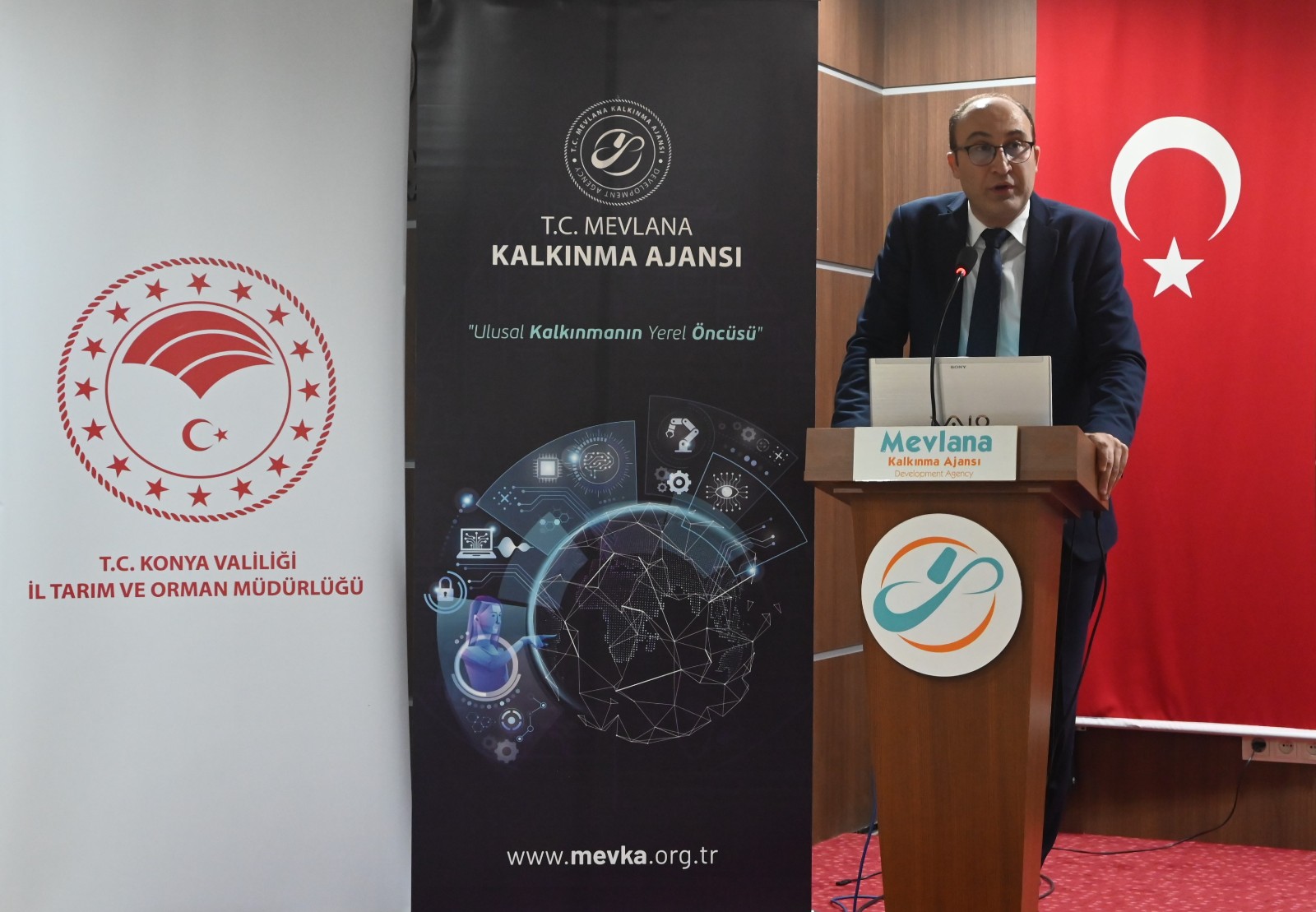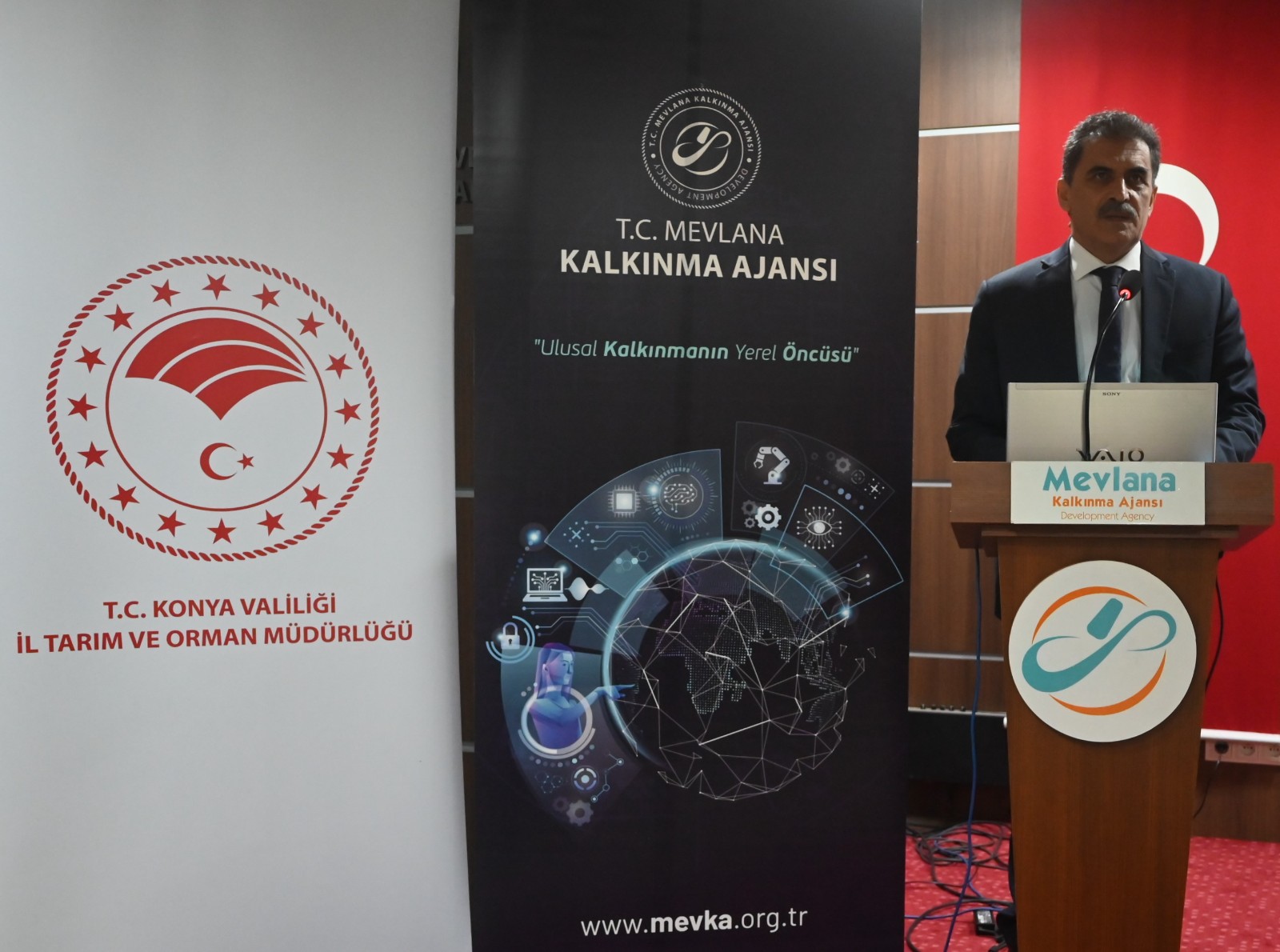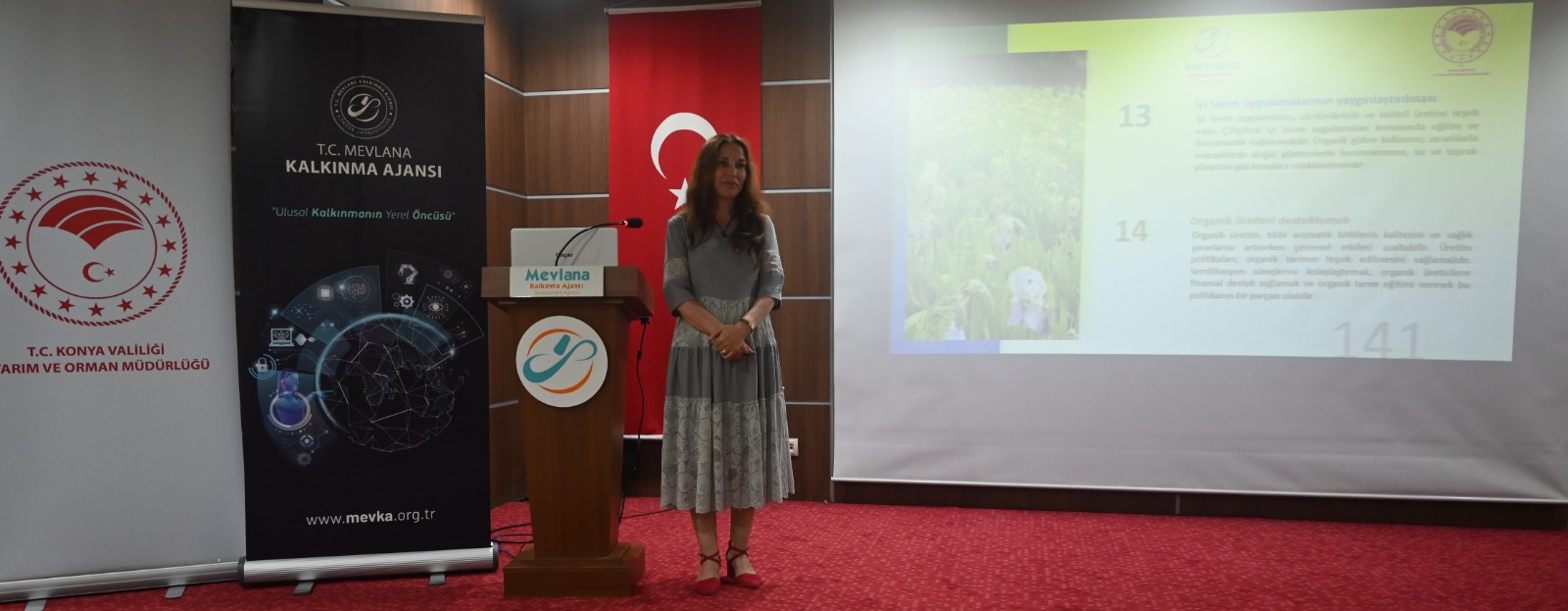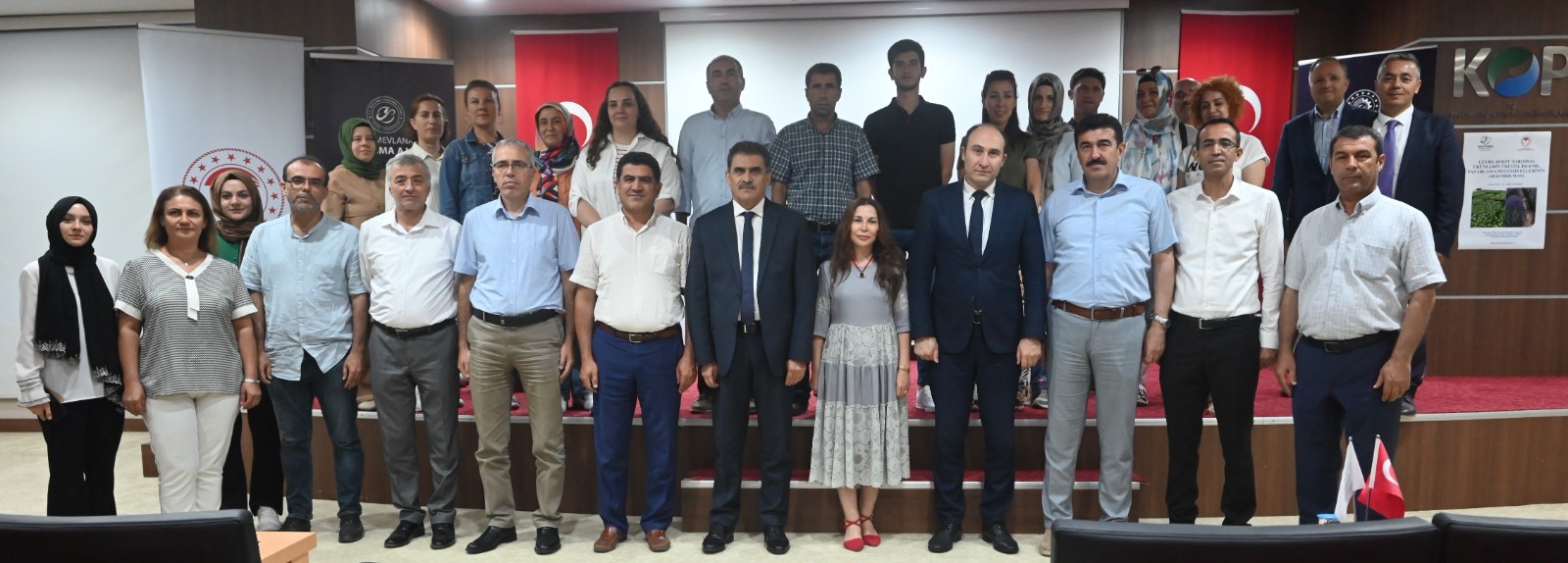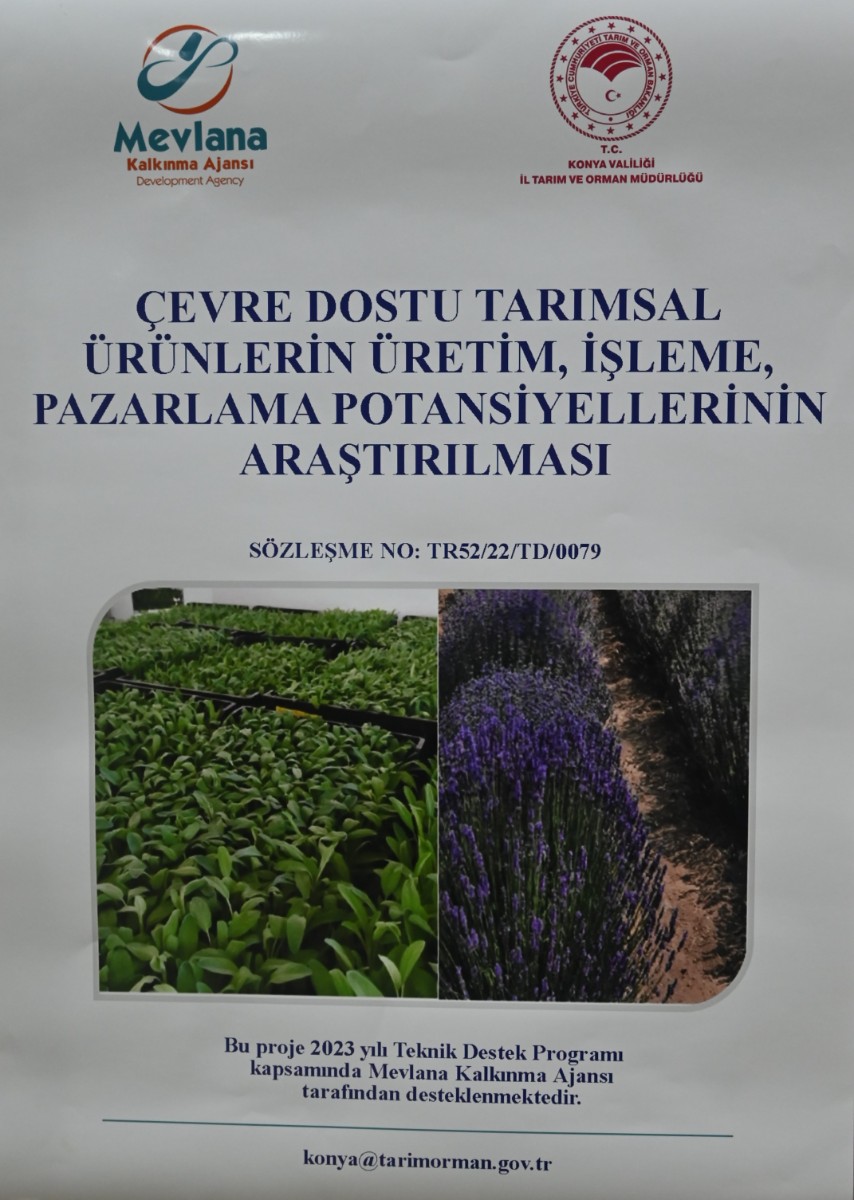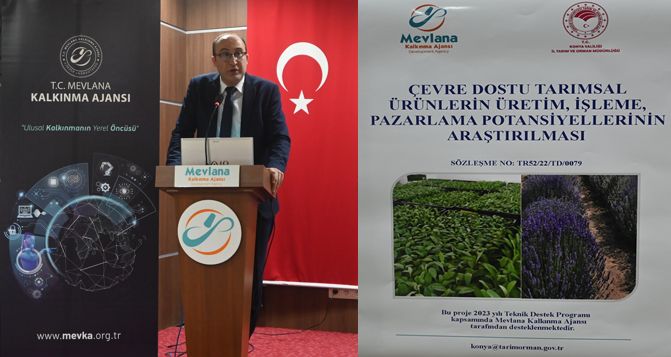Medicinal Aromatic Plants to Gain Added Value with MEVKA Support
The closing meeting of the Research on Production, Processing, and Marketing Potentials of Environmentally Friendly Agricultural Products Project, supported by Mevlana Development Agency under the Technical Support Program and carried out by Konya Provincial Directorate of Agriculture and Forestry, within the coordination of the Ministry of Industry and Technology General Directorate of Development Agencies in the TR-52 Karaman-Konya Region, was held.
MEVKA Secretary General Dr. İhsan Bostancı, Konya Provincial Director of Agriculture and Forestry Ali Ergin, representatives from public institutions, organizations, and the private sector, along with project stakeholders, participated in the program held at the MEVKA Service Building meeting hall.
Speaking at the opening of the meeting, Konya Provincial Director of Agriculture and Forestry Ali Ergin said, “Konya province is the ‘Capital of Agriculture’ with its amount of arable land, entrepreneurial and qualified human resources, suitable ecology and strong agricultural culture, strategic geographical location, agricultural industry, and supporting institutions. Konya province, with 1.87 million hectares of agricultural land, constitutes 7.84% of Turkey and ranks first in Turkey in terms of production quantity for thirteen products. Additionally, its agricultural production value is 32.78 billion TL, ranking first in Turkey in terms of agricultural production value. In today's world where the global population is rapidly increasing, crop production has become extremely important for countries. Water resources are adversely affected by the impact of climate change. Price, adequacy, water resources, and environmental conditions come to the fore when creating a production pattern. Our country has a production potential with rich plant diversity and different climatic characteristics. In this production, it is of great importance to expand the production of medicinal aromatic plants in our country, which offers the possibility of producing plants with high added value and industrial use potential. It is known that the use of medicinal aromatic plants dates back to 3000 BC. The importance of medicinal aromatic plants, used primarily for food consumption as well as for medicine and personal care products, has increased even more, especially with the Covid-19 pandemic. It is known that more than three thousand varieties of over fifty thousand medicinal aromatic plants in terms of plant product variety in the world grow in our country. Within the scope of the supports given to agricultural production by our President, Mr. Recep Tayyip Erdoğan, and with the instructions of our Minister, Mr. İbrahim Yumaklı; our Ministry is continuing the “Clustering in Medicinal Aromatic Plants” study in our province for companies in the value chain of the Medicinal Aromatic Plants Sector operating in our province, supporting institutions, education and research institutions to achieve the goals they determined with common sense and to increase their global competitiveness. Our Provincial Directorate is implementing projects to make our clustering efforts effective and to activate the medicinal aromatic plants potential of our province. Within the scope of the “Research on Production, Processing, and Marketing Potentials of Environmentally Friendly Agricultural Products Project,” as a sub-project of the clustering study carried out by our Ministry; it will contribute to those producing and marketing medicinal aromatic plants in Konya province and Turkey, researchers, and consumers who are the final beneficiaries. It will also be an important resource in terms of production, transformation into value-added products, and creation of marketing strategies. Studies and productions made with knowledge-based rational approaches and a good strategy gain value on a global scale. It is of great importance for the sector that all questions and problems of our medicinal aromatic plants sector are addressed by academic circles, and that innovative and research aspects are reflected along with R&D activities, considering future strategies. With the “Research on Production, Processing, and Marketing Potentials of Environmentally Friendly Agricultural Products” project, the production area quantity and trade of medicinal aromatic plants grown in the World, Turkey, and Konya were examined, and future expectations were researched with trend analysis. As a result of the study, by revealing the current potential of Konya province, evaluations were made on increasing the production quantity of medicinal aromatic plants, determining prominent products, and subjects for investment. I thank Mevlana Development Agency for supporting our project, Selçuk University Faculty of Agriculture, Project Coordinator Prof. Dr. Cennet Oğuz, our participants, and our institutions that ensure the sustainability of activities.”
Subsequently, MEVKA Secretary General Dr. İhsan Bostancı, providing detailed explanations about the project they supported, said, “As you know, development agencies are development units operating under the umbrella of the Ministry of Industry and Technology, possessing unique financial and technical support mechanisms, bringing together public, private sector, and non-governmental organizations, and acting as supporters, coordinators, and catalysts. As Mevlana Development Agency, we continue our efforts to ensure regional development in the Konya-Karaman Region, reduce inter-regional and intra-regional development disparities, and attract national and international investors to the region. As a result of these efforts carried out by our Agency, I would like to take this opportunity to state that over 1.5 Billion TL has been transferred to our region through various support programs we have implemented since our establishment, and an investment of 2.8 Billion TL has been mobilized with co-financing. Of course, development agencies, by their nature, are not only institutions that provide financial support in the regions they are responsible for, but also institutions that provide technical support to stakeholders in the region to strengthen the infrastructure of firms operating in that region, increase their competitiveness, and ensure that sectoral developments are monitored. In this regard, within the technical support program carried out by our agency between 2010-2023, 32 Million TL was transferred to a total of 830 projects, 680 in Konya and 150 in Karaman, thereby providing training to 17,130 people and conducting 232 analysis and reporting studies. In addition, within the program opened to SMEs since 2019; 19 family constitutions were created, 6 reports on digital transformation and resource efficiency were prepared, energy audits of 20 firms were conducted, export coaching training was given to 30 firms, and lean manufacturing studies were carried out for 9 firms. When we look at the supports provided by our Agency specifically to our Provincial Directorate of Agriculture and Forestry, we see that a total support of 450 Thousand TL has been provided for training, infrastructure, and research projects such as the Shepherd Training Project, Project Preparation Training, Land Consolidation and Geographic Information System Training, Food Safety Basic Standards Training, ISO 22000 Food Safety Training for Control Officers Inspecting Food Businesses in the Tourism Sector, and finally, the Research on Production, Processing, and Marketing Potentials of Environmentally Friendly Agricultural Products, which we had the opportunity to consult on. Today, we have come together for the project carried out by our Provincial Directorate of Agriculture and Forestry to increase the production and yields of single-year medicinal aromatic plants such as cumin, anise, black cumin, fenugreek, fennel, coriander, and buckwheat, as well as multi-year medicinal aromatic plants such as medicinal mint, sage, melissa, thyme, lavender, sumac, St. John's wort, and aronia, which will come to the fore in the future in terms of their production, in quality standards. Within this project implemented with the support of our Agency, it was aimed to research the production, collection, processing-packaging, branding, and marketing potential of medicinal aromatic plants, which are at the forefront of environmentally friendly agricultural production and have a significant share in world trade, in our province from a scientific and technological perspective, to conduct trend analysis, and to report it. Our project, whose results will be shared with the public today, will thus be finalized. I would also like to state that we will follow up on this project, to which we attach great importance in terms of its objectives and results, and that our support in this regard will continue. When we look at the recent historical development of medicinal and aromatic products, we see that especially after the 90s, interest in natural and healthy living products increased, and these products are used not only for treatment purposes but also in cosmetic products, volatile herbal oils, herbal health products, coloring dyes, and plant protection areas. As a result of this, the usage volume of the aforementioned plants has increased day by day, and a new market has emerged. In short, medicinal and aromatic plants have also become extremely important economically. While medicinal aromatic plants have a trade volume of 80 Billion Dollars worldwide, our country's export in this field is only at the level of 585 Million Dollars. As an institution, I would like to emphasize once again in your presence that we do not consider these export figures sufficient for our country, which hosts 9,222 plant species identified so far with its suitable geographical location, vegetation, and flora, and that we should get a larger share of this pie, and we are ready to do our part in this regard. With these feelings and thoughts, expressing our particular satisfaction in supporting this project, which we, as an institution, consider extremely important for our city and region, I thank our Director of Agriculture and Forestry, Mr. Ali Ergin, and his entire team for their great efforts in the realization of the project, Prof. Dr. Cennet Oğuz, Faculty Member of Selçuk University Faculty of Agriculture, for her great contributions during the execution and reporting phase of the project, and you, our esteemed participants, for not leaving us alone by sparing your precious time, and I hope that the meeting to be held will bring benefits to our city, our region, and our country.”
The meeting concluded after the question and answer session and the presentation on the project by Prof. Dr. Cennet Oğuz, Faculty Member of Selçuk University Faculty of Agriculture.


